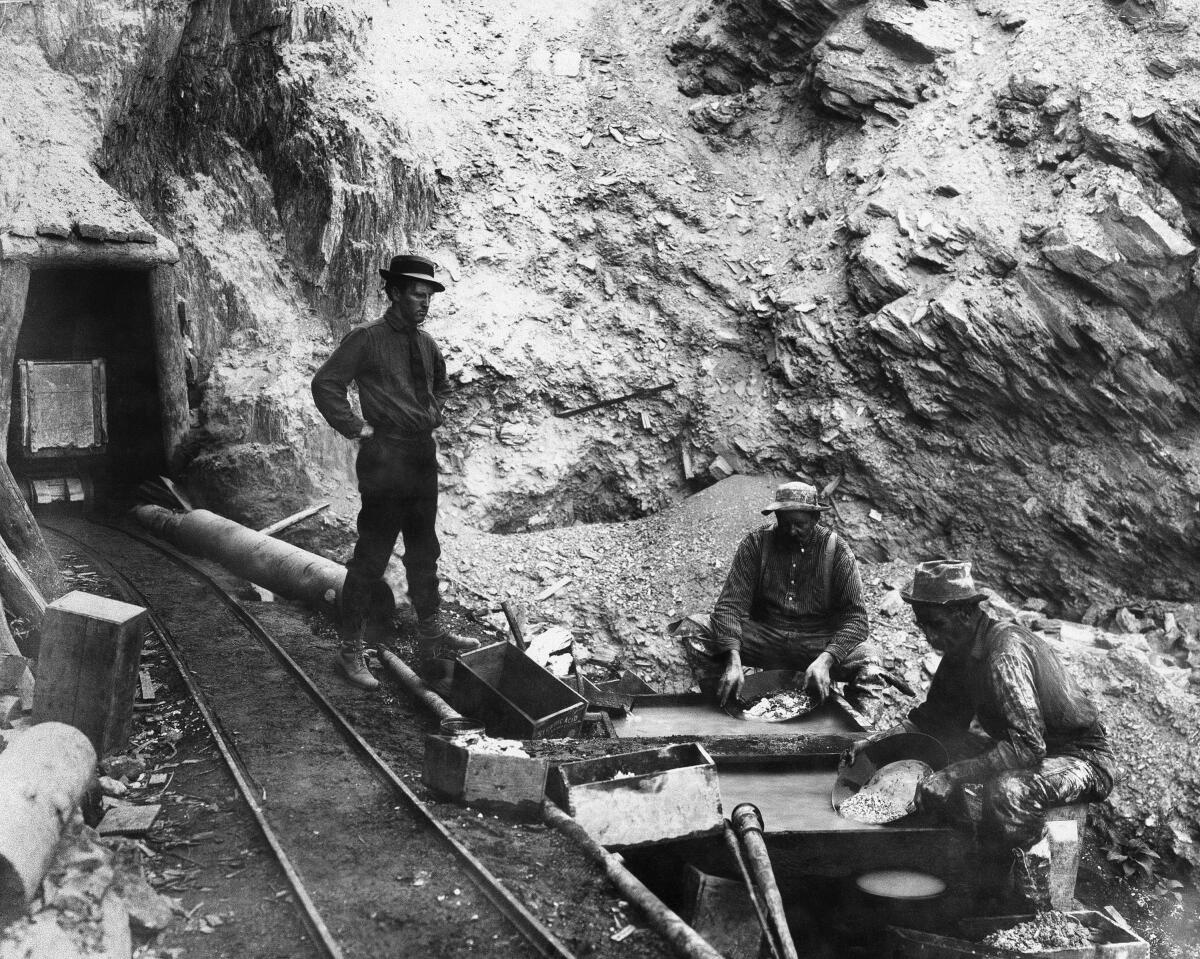Gold Rush 2.0? Why prospectors are returning to the Mojave Desert

Good morning. Here’s what you need to know to start your day.
- Why prospectors are returning to the Mojave Desert.
- the Franklin fire made a run at this celebrity-studded Malibu enclave. Some neighbors stood their ground.
- Airport facials, anyone? The 7 best luxury lounges at LAX — and how to get in.
- And here’s today’s e-newspaper.
Sign up for Essential California
The most important California stories and recommendations in your inbox every morning.
You may occasionally receive promotional content from the Los Angeles Times.
Mojave Desert’s gold rush sparks a mini real estate boom
Apparently there’s still gold in them hills.
Well, certain hills in the Mojave Desert, where a modern-day gold rush is underway.
Aurum anticipation in Kern County’s Rand District is “driving a real estate boomlet in a place that hasn’t had one in more than a century,” real estate reporter Jack Flemming wrote this week in a Times subscriber exclusive.
Gold mining shaped early California and fast-tracked its status from territory to statehood, fueled by a population boom seeking glowing fortunes. Mining towns blossomed and thrived, but gold’s value lost its luster after the Great Depression.

Many mines were abandoned and the towns around them shriveled. That’s what happened in the living ghost town of Randsburg and nearby Johannesburg, with populations of 35 and 113, respectively, according to the 2020 U.S. census.
“But over the last few years, the price of gold has soared to an all-time high; it currently sits at $2,630 per ounce,” Jack noted. “As a result, prospectors — both professional and amateur — are journeying back into these high desert mines for a chance at finding the precious metal that moves mountains.”
One of those prospectors is Sean Tucker, whose resume reads like a 6-year-old’s dream job. The globetrotting entrepreneur / treasure hunter purchased a historic mine with 11 shafts in Johannesburg and has big plans. Tucker told Jack he’s spent about $5 million so far and expects to spend $4 million more before gold starts flowing from his mines.

“It’s primal. There’s something in the ground that we want, and we’re getting it out,” he said. “It’s what California was founded on, but now we’re coming back with modern technology.”
Tucker shared with Jack his plans to start mining by next fall and hire 80 people within the next three years. He also aims to build housing for his workers on the city-block-size parcel he now owns.
Gold? Still?
Our Golden State moniker and motto (Eureka) are not just a historical throwback, as Jack explained:
“Plenty of gold is still being found. California led the nation in new gold discoveries last year, and a total of 10,373 gold-bearing locations have been unearthed in the Golden State, according to an analysis of U.S. Geological Survey data by SD Bullion.”
That possibility of millions’ to billions’ worth of gold underground is fueling a surge in mine claims. Gold seekers can lease mining rights from the Bureau of Land Management or buy property outright, provided it comes with patented mineral rights that allow them to dig underground for the precious metal.
Thus the real estate market is also surging.
“I get two, three leads per month on buyers looking for patented mine claims,” real estate agent David Treadwell told Jack. “If you can get the gold out of the ground, there’s money to be made.”
Who will strike it rich? History could hold some lessons
Hopefully it won’t come as a shock that for the overwhelming number of people who made their way to 19th century California seeking riches of gold, it didn’t pan out .
The Gold Rush mostly made rich men richer while exploiting the poor and unleashing racist violence against immigrants and California’s Indigenous peoples. Real Wild West stuff.
The mass migration was a boon for merchants, who made fortunes selling their wares to all those incoming Californians.

So far this time around, “real estate agents are making more than the gold-seekers,” Jack noted.
And he described “a muted sense of danger” out in the desert that some modern miners expressed. They worry about thieves, but mainly about the normal dangers that come with digging tunnels underground, modern equipment or not.
You can read Jack’s full story on the Times website, assuming you’re a subscriber, which is like leasing mineral rights for your brain.
Today’s top stories

Fire crews brace for a wind shift as they try to halt the Franklin fire in Malibu
- The wind shift threatens to push the blaze in a new direction, through hard-to-access mountain terrain. The fire has burned more than 4,000 acres and was 7% contained as of early Thursday.
- With winds dropping and a chance of rain on the horizon, the fire danger ebbs in Los Angeles.
- The blaze made a run at a celebrity-studded Malibu enclave, where some residents stood their ground.
- These satellite photos show how the fire has threatened Malibu neighborhoods.
Los Angeles County hate crimes reached an all-time high last year
- There were 1,350 reported hate crimes in 2023, a 45% increase from the year before, according to the county’s Commission on Human Relations. That’s the most incidents since the commission began counting in 1980.
- “This is obviously unacceptable,” said Bamby Salcedo, a transgender activist whose organization, TransLatin@ Coalition, received multiple bomb threats earlier this year.
Why Wells Fargo’s San Francisco downsizing is bad news for California banking
- Wells Fargo is selling its longtime headquarters in San Francisco’s Financial District and moving to leased offices nearby, raising questions about its commitment to the city.
- Another blow to San Francisco came last summer when Elon Musk announced he was moving the social media platform X, formerly known as Twitter, to Texas.
As children’s book bans soar, sales are down and librarians are afraid — even in California
- Schools and libraries aren’t buying books about LGBTQ+ issues and race as they brace for culture war pushback.
- The national furor in recent years around banning of books has intensified as President-elect Donald Trump threatens to shut down the Department of Education, emboldening conservatives to end “wokeness” in classrooms.
What else is going on
- In a leaked tape, a probation official said L.A. County could defy an order to close a juvenile hall.
- Hannah Kobayashi, the Maui woman deemed “voluntarily missing” by the LAPD after she vanished last month, has been found safe, her family announced.
- Jahnay Bryan has been missing in L.A. for 2 months. Why don’t police have an update?
- Two people have been arrested in the execution-style slaying of a popular Woodland Hills doctor.
- Monarch butterflies might be added to the nation’s endangered species list.
Get unlimited access to the Los Angeles Times. Subscribe here.
Commentary and opinions
- The killing of a UnitedHealthcare executive won’t improve anyone’s coverage, but this would, writes Jamie Court, president of the nonprofit Consumer Watchdog.
- The California Latino Legislative Caucus does not admit Republicans. Columnist Gustavo Arellano examines whether it’s time to change the rules.
- Conservatives have targeted LAUSD’s Black student achievement program. The district shouldn’t give in, argue Tyrone C. Howard and Pedro Noguera in a guest opinion.
- Randall Balmer, a religion professor at Dartmouth College, discusses why evangelical Christians turned away from social activism.
This morning’s must read
These tenants needed a buyer who would be willing to sacrifice profit to keep the rents affordable. When the property’s owner died, investors eyed the Cypress Park rental she had owned since the 1970s. Then a local nonprofit stepped in.
How can we make this newsletter more useful? Send comments to [email protected].
For your downtime
Going out
- ✈️ A spa at the airport? Here are the seven best luxury lounges at LAX — and how to get in.
- 🥾 A hike among redwoods in California’s oldest state park reveals the “resilience of nature.”
- 🧱 A stunning Brutalist concrete home in L.A. rivals its neighbor, the Hollywood sign.
Staying in
- 📚 A Holocaust novel zigzags through fact and fiction to memorialize a Polish teenager, our critic writes.
- 🧑🍳 Here’s a recipe for chocolate peppermint snaps.
- ✏️ Get our free daily crossword puzzle, sudoku, word search and arcade games.
A question for you: What are your favorite holiday traditions?
Michael Hotten writes: “For a couple days out of the holiday season, our kitchen is dedicated to the memory of my grandmother. My wife — with my assistance — bakes about a dozen loaves of the Croatian holiday bread povitica. There are many flavors — chocolate, strawberry, apple — but we go for grandma’s classic: walnut.
“These breads bring back deep memories for my mother, sisters and my mother’s two brothers, one of whom recently passed. He actually loved apple povitica. The smell, the texture, the taste take them back to time and place and my grandma. ... She was way better than us with the recipe and the baking but my wife — who only met her twice — loves keeping up the tradition. And I love being the official taster.”
Email us at [email protected], and your response might be included in the newsletter this week.
And finally ... from our archives
The U.S. Supreme Court released its landmark decision in Bush vs. Gore on Dec. 12, 2000, a ruling that handed the 2000 election to George W. Bush.
“The high court decision, a complicated skein of overlapping opinions, provided a fittingly confusing end to a campaign that has been muddled from the moment the polls closed,” wrote David G. Savage and Mark Z. Barabak at the time.
“The opinion in Bush vs. Gore was handed down at 10 p.m. EST, exactly five weeks after the election night debacle in which the television networks first called the presidency for Bush, then judged it too close to call.”
Have a great day, from the Essential California team.
Ryan Fonseca, reporter
Defne Karabatur, fellow
Andrew Campa, Sunday reporter
Hunter Clauss, multiplatform editor
Christian Orozco, assistant editor
Stephanie Chavez, deputy metro editor
Karim Doumar, head of newsletters
Check our top stories, topics and the latest articles on latimes.com.
Sign up for Essential California
The most important California stories and recommendations in your inbox every morning.
You may occasionally receive promotional content from the Los Angeles Times.







